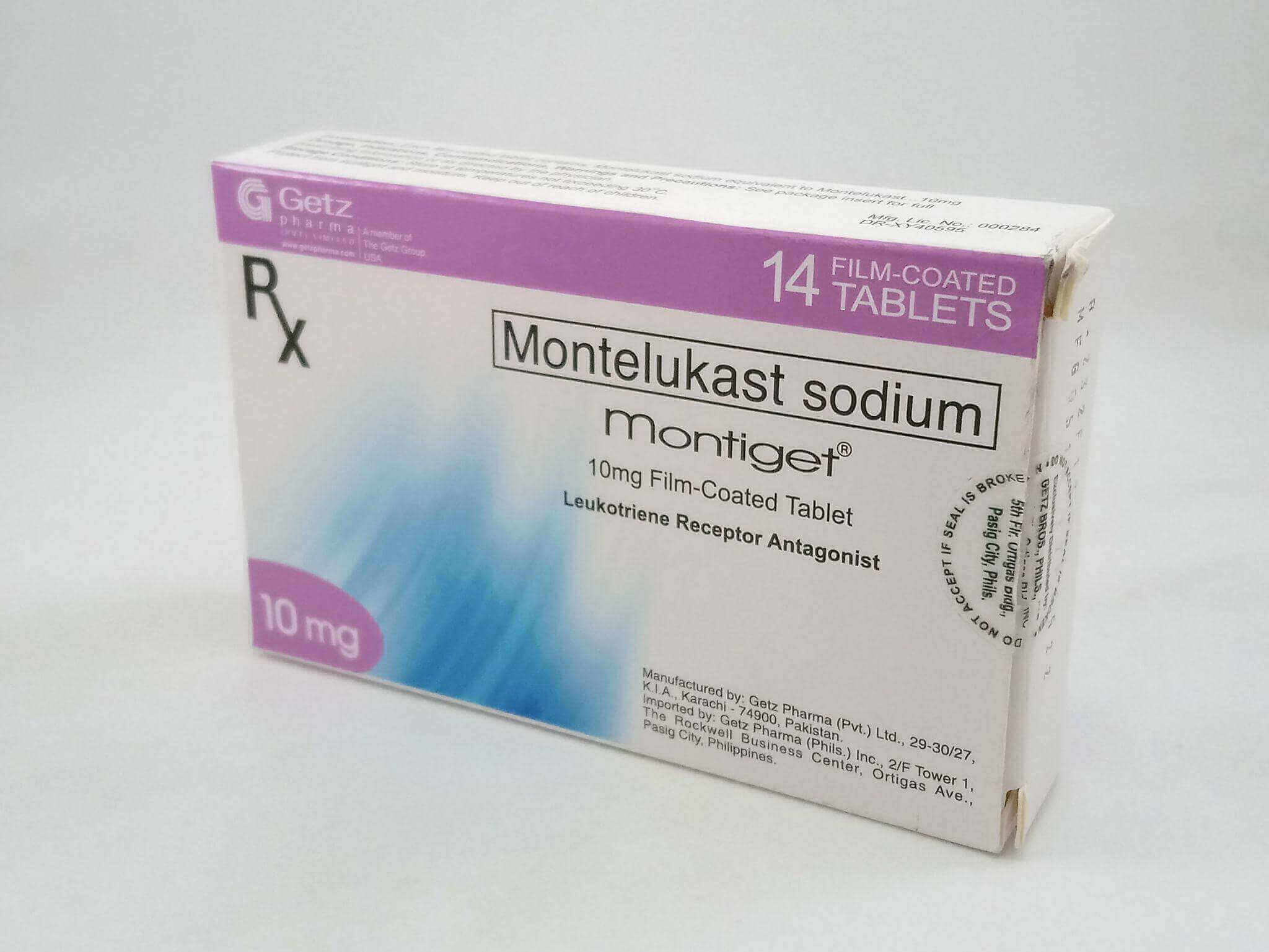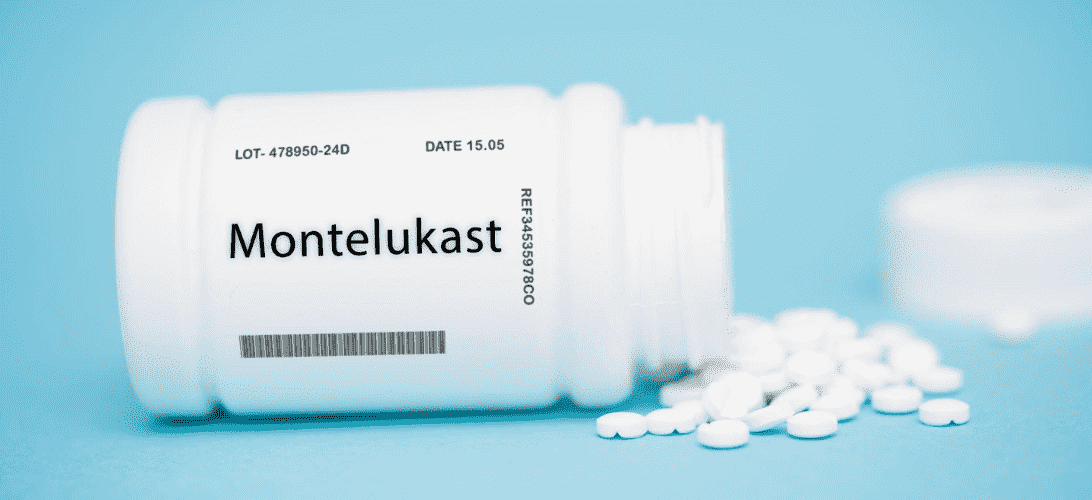Highlights
- Montelukast is a generic drug that treats asthma and allergy symptoms by reducing inflammation in the airways.
- The brand name of montelukast is Singulair.
- Montelukast is a long-acting medication taken once daily and comes in granules, chewable tablets, and non-chewable tablets.
- In 2020, the FDA added a black-box warning regarding potential mental health side effects and advising that use should be restricted to allergic rhinitis.
- There are also several common and less-common side effects of montelukast, along with possible drug interactions.
Montelukast (pronounced mon-teh-LOO-kast) is a generic drug that treats the symptoms of asthma and allergies. It is available by prescription only, so you will need to speak with your healthcare provider to see if montelukast is right for you. Read on to learn more about montelukast, including uses, dosages, side effects, and more.
What Is Montelukast and What Is It Used For?
Montelukast (also known as Singulair) is an anti-inflammatory medication and bronchodilator that relieves asthma symptoms, such as wheezing, coughing, or shortness of breath. This drug is often prescribed on a long-term basis for asthma patients as well as for temporary relief of allergic rhinitis symptoms, such as nasal itching, runny noses, congestion, or sneezing.
Montelukast was developed in the 1990s after scientists and researchers studied how the body reacts to allergens and other triggers. They identified specific chemical pathways that contribute to asthma and allergy symptoms. Montelukast earned FDA approval for use in the United States in 1998 under the brand name Singulair, with generic versions of the drug entering the market in 2012.
However, in 2020, the FDA issued a black-box warning advising that this medication may cause significant mental health side effects; see Potential Side Effects below.
How Does Montelukast Work?

Montelukast is one of a class of drugs called leukotriene receptor antagonists (LTRAs), which block inflammatory actions in the body.
There are two types of leukotriene receptors: LTR1 and LTR2. When leukotriene binds to these receptors, it triggers a series of events that lead to an increase in mucus production and narrowing of the airways. Leukotriene receptor antagonists target both types, but they have a greater effect on LTR1 receptors.
Specifically, montelukast blocks leukotriene D4 to decrease inflammation in the airways and relax the muscles, which helps to relieve asthma and allergy symptoms.
What Formulas Are Available for Montelukast?
Montelukast is available in its generic form as a tablet, chewable tablet, and granules. It is also available as Singulair in tablet form.
Montelukast Dosage and Administration
Montelukast is available in 4 milligram, 5 milligram, and 10 milligram strengths.
The 4 milligram strength is only available in the granule form and is recommended for children between 12 months and 5 years of age.
The 5 milligram dose is available as both granules and a chewable tablet taken once per day. This dose is recommended for children between 6 years and 14 years of age.
The 10 milligram dose is available only as a non-chewable tablet taken once per day and is recommended for individuals who are 15 years or older.
How Should I Take Montelukast?

Many doctors recommend taking montelukast in the evening. However, your doctor may suggest taking montelukast 1-2 hours prior to exercise if exercise worsens your asthma symptoms.
For young children taking granules, the granules can be placed directly on the tongue or mixed with a spoonful of soft food, such as yogurt or applesauce. The entire dose should be taken within 15 minutes. Avoid mixing the granules in a drink; however, you can give your child a drink after they swallow all of the granules.
Chewable tablets should be taken one hour before food or two hours after food to ensure proper absorption.
The non-chewable tablets can be taken with or without food.
What Are the Potential Side Effects of Montelukast?
Montelukast can produce significant side effects, some common and some less common but more serious.
Common Side Effects
- Cough
- Fever
- Stuffy or runny nose
- Ear infections
- Ear aches
- Sinus infections
- Upper respiratory infections
- Diarrhea
- Sore throat
- Stomach pains
- Body aches
- Trouble swallowing
- Voice changes or loss of voice
- Tender or swollen glands in the neck
Less-Common Side Effects
Should be reported to your doctor and include:
- Hives
- Skin rashes
- Bruising
- Bleeding
- Pain or muscle weakness
- Bloody nose
- Joint pain
- Blurred vision
- Heartburn
- Dental pain
- Pus in the urine
In many cases, common side effects appear as your body adjusts to the medication and will usually go away on their own. However, it’s always advisable to speak with your doctor if you are concerned about any side effects you’re experiencing.
Mental Health Side Effects
In 2020, the FDA added a black-box warning to montelukast, advising that this medication can cause suicidal thoughts, aggressive behavior, depression, attention problems, anxiety, confusion or disorientation, or irritability. The FDA does not specify how common these side effects are:
“All medicines have side effects even when used correctly as prescribed. It is important to know that people respond differently to all medicines depending on their health, the diseases they have, genetic factors, other medicines they are taking, and many other factors. As a result, we cannot determine how likely it is that someone will experience these side effects when taking montelukast.”
Because of the potential for mental health side effects, the FDA recommends that this medication be reserved for patients who have not responded adequately to other asthma-controller medications or cannot tolerate these medications.
If you experience mental health symptoms like agitation, aggression, confusion, memory loss, unusual dreams, hallucinations, depression, or suicidal thoughts, stop taking montelukast and call your doctor. Note that these side effects can occur at any time after starting the medication and can continue after stopping it.
For more information, please consult the FDA warning.
What Should I Avoid When Taking Montelukast?
People taking certain medications or supplements should let their doctor know before starting this medication; they may need to avoid montelukast. (See Potential Drug Interactions below.)
Patients with existing mental health issues should talk to their doctor about the risks and benefits of taking this medication. (See Potential Side Effects above.)
What Should I Do If I Miss a Dose of Montelukast?
If you miss a dose, skip it and take the next dose the following day at your normal time. Never take two doses in a single day to make up for a missed dose.
What Should I Do If I Overdose on Montelukast?
If you overdose on montelukast, call your Poison Control Center or seek medical attention immediately. The National Poison Control hotline is open 24/7 at 1-800-222-1222.
Who Should Not Take Montelukast?
You should not take montelukast if you are allergic to it. Your doctor should know if you are pregnant or breastfeeding, or if you have a history of mental illness, psychosis, liver disease, or a history of severe allergic reactions after taking aspirin or other NSAIDs.
Are There any Potential Drug Interactions With Montelukast?
Yes. If you’re taking any of the following, be sure your doctor knows before you start taking montelukast:
- Nonsteroidal anti-inflammatory drugs (NSAIDs). NSAIDs, such as aspirin, ibuprofen, and naproxen, can increase the risk of liver damage when taken with montelukast.
- Stimulants, such as amphetamines and caffeine. These medications can increase the metabolism of montelukast and make it less effective.
- Herbal supplements, such as St. John’s wort and ginkgo biloba. These supplements can also interact with montelukast and make it less effective.
- CYP2C8 substrates, such as the antimalarial drug amodiaquine. Montelukast inhibits the drug-metabolizing enzyme CYP2C8. A combination of montelukast with a CYP2C8 substrate could increase the plasma concentration of the substrate.
- People with phenylketonuria (PKU) should avoid the chewable tablet formulation of montelukast. This form of the medication contains aspartame, which can make this condition worse.
Get the Lowest Price for Montelukast With BidRx
Montelukast has been deemed safe for most patients and can provide much-needed relief for asthma and allergy symptoms. Get the lowest price on montelukast by letting pharmacies compete for your business. Sign up for a free account and create your bid today!
